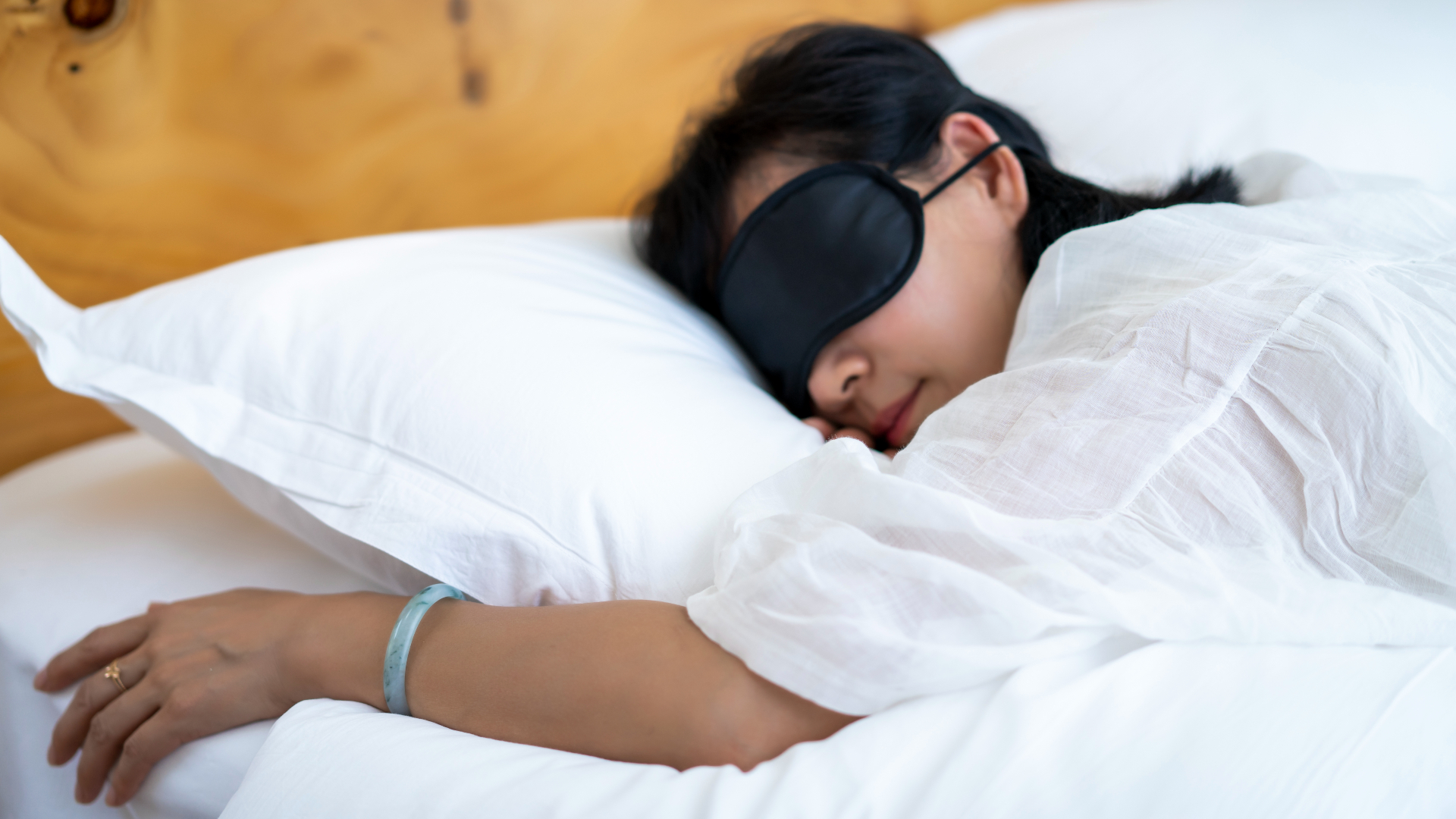Can you make up for lost sleep?
Getting a few extra hours on the weekend cannot make up for all the harms of being sleep-deprived during the week.

Get the world’s most fascinating discoveries delivered straight to your inbox.
You are now subscribed
Your newsletter sign-up was successful
Want to add more newsletters?

Delivered Daily
Daily Newsletter
Sign up for the latest discoveries, groundbreaking research and fascinating breakthroughs that impact you and the wider world direct to your inbox.

Once a week
Life's Little Mysteries
Feed your curiosity with an exclusive mystery every week, solved with science and delivered direct to your inbox before it's seen anywhere else.

Once a week
How It Works
Sign up to our free science & technology newsletter for your weekly fix of fascinating articles, quick quizzes, amazing images, and more

Delivered daily
Space.com Newsletter
Breaking space news, the latest updates on rocket launches, skywatching events and more!

Once a month
Watch This Space
Sign up to our monthly entertainment newsletter to keep up with all our coverage of the latest sci-fi and space movies, tv shows, games and books.

Once a week
Night Sky This Week
Discover this week's must-see night sky events, moon phases, and stunning astrophotos. Sign up for our skywatching newsletter and explore the universe with us!
Join the club
Get full access to premium articles, exclusive features and a growing list of member rewards.
When clocks in most states fall back with the end of daylight saving time on the first Sunday of November in the United States, millions of people will enjoy an extra hour of sleep.
On any given night, getting one additional hour of sleep can make a big difference in physical and mental well-being. So does that mean you can use an extra hour of slumber here or there as an opportunity to make up for all-nighters?
Not exactly. A growing body of research shows a single night of catch-up sleep can't make up for days or weeks of poor or inadequate sleep. Rather, consider using the extra hour as an opportunity to change a few habits in order to achieve more efficient and sufficient sleep every night.

Robert Roy Britt, author of "Make Sleep Your Superpower: A Guide to Greater Health, Happiness & Productivity," is a former editor at Live Science. He writes weekly about health and wellness on Medium.
Why sleep is so important
Insufficient sleep — often defined in studies as anything less than seven hours per night for most adults — is linked to significant memory problems, poor decision-making and a compromised immune system, along with a higher risk of weight gain, heart disease, depression and dementia. Various studies have shown that playing sleep catch-up on weekends does not effectively lower these risks.
"The current data suggest that getting extra or catch-up sleep on weekends cannot protect you from this risk if you get short sleep during the workweek," said Christopher Depner, an assistant professor adjunct at the University of Colorado Boulder who worked on one such study.
"Even if you mentally feel better after getting more sleep on the weekend, you are still at risk of these diseases from the short sleep during the workweek," Depner told Live Science. "Data show the more your sleep varies between workdays and the weekend, the higher your risk is for these diseases."
Related: Why it's time to abolish daylight saving time
Get the world’s most fascinating discoveries delivered straight to your inbox.
The beauty of rest
Instead, better sleep on a nightly basis is a ticket to improved mind-and-body wellness and, in a nutshell, better days.
Most adults need roughly seven to eight hours of sleep nightly, according to a rough consensus among most experts. Kids and teens need more. But the amount that adults need varies by individual; some people are genetically programmed to successfully get by on less if their sleep is highly efficient, as I explain in my new book, "Make Sleep Your Superpower" (self-published, 2022).
A study earlier this year in the journal Nature Aging suggested that seven hours is ideal for most adults. Other research has suggested that sleeping less than six hours or more than eight hours is bad for heart health.
If you take seven hours as a reasonable minimum threshold for most adults, as the federal government does, then roughly a third of U.S. adults don't get enough sleep.
The best way to gauge whether you are getting enough good sleep is by assessing how you feel during the day. Here are some signs that your sleep is subpar, according to multiple sleep experts:
- You have trouble waking up or getting out of bed.
- You struggle with focus or memory.
- You have frequent bad moods or a short temper.
- You are tired in the afternoon.
If any of those sound familiar, then an extra hour of sleep could be a boon to your mood, mental sharpness, emotional stability and productivity. Here's what happens on a good night:
- The day's events and experiences are processed and moved into long-term storage, as memories, while extraneous information, and even bad thoughts, are shuttled out of the mind.
- The brain is cleaned of built-up waste by a garbage-collection process called the glymphatic system, a network of microvessels surrounding the brain that has become understood only in the past decade.
- Growth hormones and other chemicals are released to restore and refresh organs, blood and tissues throughout the body.
The bulk of this cleanup, repair and rejuvenation happens during the deepest stage of sleep, when brain waves are at their slowest, and during the rapid-eye movement (REM) stage, when dreams are common. These critical stages of sleep recur in multiple cycles, interspersed with lighter stages, during the night. When sleep is too light, fragmented or brief, vital minutes of restorative sleep are lost, and overall sleep quality and efficiency decline.
The problem with makeup sleep
If you need an extra hour of sleep now and then, take it, experts agree. Just recognize it as a bandage, not a cure. As with other chronic unhealthy behaviors, like routinely drinking too much or regularly eating junk food, experts say that sleeping too little over time can cause damage to the body that isn’t entirely fixable. You can treat your mind and body better moving forward, but you can’t fully rewind the clock on damage that’s done. Meanwhile, the damage can build quickly.
A single hour of lost sleep — as can happen when clocks move forward in the spring, or on any bad night — disrupts the body's internal sleep-wake clock, called the circadian rhythm, for up to a week. The more sleep you miss, the worse things get. In a 2020 study in the journal Scientific Reports, people took memory tests before and after being totally deprived of sleep one night, and then again after two nights of catch-up slumber involving 10 hours in bed each night. While some brain function was restored by the recovery sleep, brain scans showed, performance on memory tests did not improve after catch-up sleep.
After three consecutive nights of getting less than six hours of sleep, people were noticeably more angry, nervous and frustrated, and had symptoms of gastrointestinal problems and respiratory issues, according to a 2021 study in the journal Annals of Behavioral Medicine.
"If you had a bad night sleep, it may be wise to acknowledge that your next-day well-being and functioning may be lower than your usual levels and not to extend your work and activities on the day after a bad night's sleep," said study leader Soomi Lee, an assistant professor at the University of South Florida who studies sleep and stress.
"It may be OK to have one or two bad sleep nights," Lee told Live Science. "However, a real health problem may occur if you accumulate bad sleep nights over time. Thus, efforts should be centered on compensating for lost sleep in between."
A recent study published in the Journal of Experimental Medicine hinted at how the ill effects add up. Fourteen healthy adults spent six weeks sleeping 90 minutes less than their normal 7.5 to eight hours. The lack of sleep altered the DNA inside key immune system stem cells, triggering an overreaction of the system that can cause inflammation throughout the body. A similar experiment on mice by the same researchers had the same effect. Then, after weeks of recovery sleep, the mice still had compromised immune systems. The researchers hypothesized that humans experience similar long-lasting degradation.
"Our findings suggest that sleep recovery is not able to fully reverse the effects of poor-quality sleep," the research paper's first author, Dr. Cameron McAlpine, an assistant professor of cardiology at the Icahn School of Medicine at Mount Sinai in New York City, said in a statement.
How one hour can make a difference
The key to quality sleep is to engage in good sleep habits, if you aren't already. Here are just a few of the 20 most important tactics outlined in my book for improving sleep quality and duration:
- Pick a reasonable bedtime, ideally before midnight, and stick to it as best you can, even on weekends.
- Wake up at roughly the same time daily, and roll out of bed without snoozing.
- Enjoy as much natural, outdoor light as you can during the day, especially first thing in the morning, to properly set your circadian rhythm.
- Get at least 2.5 hours weekly (equal to 22 minutes daily) of physical activity, such as brisk walking.
- Limit your consumption of alcohol; drinking might help you pass out, but it destroys sleep quality.
- In the evening, avoid caffeine, bright lights and stressful activities, like reading bad news, sending work emails or scrolling through social media.
If you're sleeping less than seven hours nightly and you're not feeling on top of your game during the day, here's the takeaway: Instead of trying to make up for lost sleep regularly, focus on getting more and better sleep every night, because better nights promise better days.
Robert is an independent health and science journalist and writer based in Phoenix, Arizona. He is a former editor-in-chief of Live Science with over 20 years of experience as a reporter and editor. He has worked on websites such as Space.com and Tom's Guide, and is a contributor on Medium, covering how we age and how to optimize the mind and body through time. He has a journalism degree from Humboldt State University in California.
 Live Science Plus
Live Science Plus











